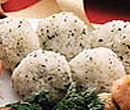|
Adding a little nigari to your cooking will make it taste great!
The magnesium in nigari has great permeability, and whether you’re cooking meat, fish or vegetables, the minerals in nigari removes elements that cause bad smells or bitterness, leaving a clear broth.
When you’re preparing fish, just add nigari and salt and leave it for 30 minutes. The saltiness penetrates to the core while impurities are removed, allowing you to make lovely, crisp grilled fish. Also, if you prepare fish this way and freeze it, it can be thawed out and used later, still tasting great.
Plus, when making stewed vegetables, stewing them for a long time causes the vegetables to lose shape. This is because the pectin, which holds the vegetables together, is destroyed during the cooking process. The magnesium in nigari will prevent the pectin from being destroyed and also makes the flavor soak right through the vegetables in record time!
Finally, you’ve heard that using natural salt in cooking improves the taste, but in actual fact this is the nigari in natural salt working to bring out the best flavors! In fact, nigari is poised to become the sixth seasoning, after sugar, salt, vinegar, soy sauce and soy bean paste.
|



|